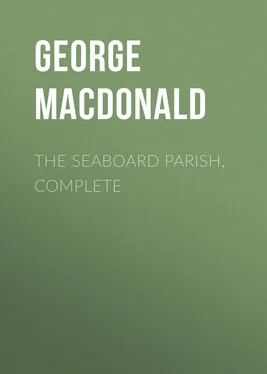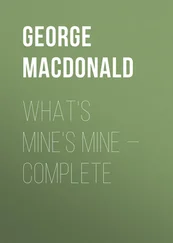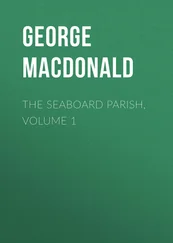George MacDonald - The Seaboard Parish, Complete
Здесь есть возможность читать онлайн «George MacDonald - The Seaboard Parish, Complete» — ознакомительный отрывок электронной книги совершенно бесплатно, а после прочтения отрывка купить полную версию. В некоторых случаях можно слушать аудио, скачать через торрент в формате fb2 и присутствует краткое содержание. Жанр: foreign_prose, literature_19, foreign_antique, на английском языке. Описание произведения, (предисловие) а так же отзывы посетителей доступны на портале библиотеки ЛибКат.
- Название:The Seaboard Parish, Complete
- Автор:
- Жанр:
- Год:неизвестен
- ISBN:нет данных
- Рейтинг книги:3 / 5. Голосов: 1
-
Избранное:Добавить в избранное
- Отзывы:
-
Ваша оценка:
- 60
- 1
- 2
- 3
- 4
- 5
The Seaboard Parish, Complete: краткое содержание, описание и аннотация
Предлагаем к чтению аннотацию, описание, краткое содержание или предисловие (зависит от того, что написал сам автор книги «The Seaboard Parish, Complete»). Если вы не нашли необходимую информацию о книге — напишите в комментариях, мы постараемся отыскать её.
The Seaboard Parish, Complete — читать онлайн ознакомительный отрывок
Ниже представлен текст книги, разбитый по страницам. Система сохранения места последней прочитанной страницы, позволяет с удобством читать онлайн бесплатно книгу «The Seaboard Parish, Complete», без необходимости каждый раз заново искать на чём Вы остановились. Поставьте закладку, и сможете в любой момент перейти на страницу, на которой закончили чтение.
Интервал:
Закладка:
“What is it like, papa?”
“It is growing dark,” I answered, “as you can see. It is a still evening, and what they call a black frost. The trees are standing as still as if they were carved out of stone, and would snap off everywhere if the wind were to blow. The ground is dark, and as hard as if it were of cast iron. A gloomy night rather, my dear. It looks as if there were something upon its mind that made it sullenly thoughtful; but the stars are coming out one after another overhead, and the sky will be all awake soon. A strange thing the life that goes on all night, is it not? The life of owlets, and mice, and beasts of prey, and bats, and stars,” I said, with no very categorical arrangement, “and dreams, and flowers that don’t go to sleep like the rest, but send out their scent all night long. Only those are gone now. There are no scents abroad, not even of the earth in such a frost as this.”
“Don’t you think it looks sometimes, papa, as if God turned his back on the world, or went farther away from it for a while?”
“Tell me a little more what you mean, Connie.”
“Well, this night now, this dark, frozen, lifeless night, which you have been describing to me, isn’t like God at all—is it?”
“No, it is not. I see what you mean now.”
“It is just as if he had gone away and said, ‘Now you shall see what you can do without me.’
“Something like that. But do you know that English people—at least I think so—enjoy the changeful weather of their country much more upon the whole than those who have fine weather constantly? You see it is not enough to satisfy God’s goodness that he should give us all things richly to enjoy, but he must make us able to enjoy them as richly as he gives them. He has to consider not only the gift, but the receiver of the gift. He has to make us able to take the gift and make it our own, as well as to give us the gift. In fact, it is not real giving, with the full, that is, the divine, meaning of giving, without it. He has to give us to the gift as well as give the gift to us. Now for this, a break, an interruption is good, is invaluable, for then we begin to think about the thing, and do something in the matter ourselves. The wonder of God’s teaching is that, in great part, he makes us not merely learn, but teach ourselves, and that is far grander than if he only made our minds as he makes our bodies.”
“I think I understand you, papa. For since I have been ill, you would wonder, if you could see into me, how even what you tell me about the world out of doors gives me more pleasure than I think I ever had when I could go about in it just as I liked.”
“It wouldn’t do that, though, you know, if you hadn’t had the other first. The pleasure you have comes as much from your memory as from my news.”
“I see that, papa.”
“Now can you tell me anything in history that confirms what I have been saying?”
“I don’t know anything about history, papa. The only thing that comes into my head is what you were saying yourself the other day about Milton’s blindness.”
“Ah, yes. I had not thought of that. Do you know, I do believe that God wanted a grand poem from that man, and therefore blinded him that he might be able to write it. But he had first trained him up to the point—given him thirty years in which he had not to provide the bread of a single day, only to learn and think; then set him to teach boys; then placed him at Cromwell’s side, in the midst of the tumultuous movement of public affairs, into which the late student entered with all his heart and soul; and then last of all he cast the veil of a divine darkness over him, sent him into a chamber far more retired than that in which he laboured at Cambridge, and set him like the nightingale to sing darkling. The blackness about him was just the great canvas which God gave him to cover with forms of light and music. Deep wells of memory burst upwards from below; the windows of heaven were opened from above; from both rushed the deluge of song which flooded his soul, and which he has poured out in a great river to us.”
“It was rather hard for poor Milton, though, wasn’t it, papa?”
“Wait till he says so, my dear. We are sometimes too ready with our sympathy, and think things a great deal worse than those who have to undergo them. Who would not be glad to be struck with such blindness as Milton’s?”
“Those that do not care about his poetry, papa,” answered Constance, with a deprecatory smile.
“Well said, my Connie. And to such it never can come. But, if it please God, you will love Milton before you are about again. You can’t love one you know nothing about.”
“I have tried to read him a little.”
“Yes, I daresay. You might as well talk of liking a man whose face you had never seen, because you did not approve of the back of his coat. But you and Milton together have led me away from a far grander instance of what we had been talking about. Are you tired, darling?”
“Not the least, papa. You don’t mind what I said about Milton?”
“Not at all, my dear. I like your honesty. But I should mind very much if you thought, with your ignorance of Milton, that your judgment of him was more likely to be right than mine, with my knowledge of him.”
“O, papa! I am only sorry that I am not capable of appreciating him.”
“There you are wrong again. I think you are quite capable of appreciating him. But you cannot appreciate what you have never seen. You think of him as dry, and think you ought to be able to like dry things. Now he is not dry, and you ought not to be able to like dry things. You have a figure before you in your fancy, which is dry, and which you call Milton. But it is no more Milton than your dull-faced Dutch doll, which you called after her, was your merry Aunt Judy. But here comes your mamma; and I haven’t said what I wanted to say yet.”
“But surely, husband, you can say it all the same,” said my wife. “I will go away if you can’t.”
“I can say it all the better, my love. Come and sit down here beside me. I was trying to show Connie—”
“You did show me, papa.”
“Well, I was showing Connie that a gift has sometimes to be taken away again before we can know what it is worth, and so receive it right.”
Ethelwyn sighed. She was always more open to the mournful than the glad. Her heart had been dreadfully wrung in her youth.
“And I was going on to give her the greatest instance of it in human history. As long as our Lord was with his disciples, they could not see him right: he was too near them. Too much light, too many words, too much revelation, blinds or stupefies. The Lord had been with them long enough. They loved him dearly, and yet often forgot his words almost as soon as he said them. He could not get it into them, for instance, that he had not come to be a king. Whatever he said, they shaped it over again after their own fancy; and their minds were so full of their own worldly notions of grandeur and command, that they could not receive into their souls the gift of God present before their eyes. Therefore he was taken away, that his Spirit, which was more himself than his bodily presence, might come into them—that they might receive the gift of God into their innermost being. After he had gone out of their sight, and they might look all around and down in the grave and up in the air, and not see him anywhere—when they thought they had lost him, he began to come to them again from the other side—from the inside. They found that the image of him which his presence with them had printed in light upon their souls, began to revive in the dark of his absence; and not that only, but that in looking at it without the overwhelming of his bodily presence, lines and forms and meanings began to dawn out of it which they had never seen before. And his words came back to them, no longer as they had received them, but as he meant them. The spirit of Christ filling their hearts and giving them new power, made them remember, by making them able to understand, all that he had said to them. They were then always saying to each other, ‘You remember how;’ whereas before, they had been always staring at each other with astonishment and something very near incredulity, while he spoke to them. So that after he had gone away, he was really nearer to them than he had been before. The meaning of anything is more than its visible presence. There is a soul in everything, and that soul is the meaning of it. The soul of the world and all its beauty has come nearer to you, my dear, just because you are separated from it for a time.”
Читать дальшеИнтервал:
Закладка:
Похожие книги на «The Seaboard Parish, Complete»
Представляем Вашему вниманию похожие книги на «The Seaboard Parish, Complete» списком для выбора. Мы отобрали схожую по названию и смыслу литературу в надежде предоставить читателям больше вариантов отыскать новые, интересные, ещё непрочитанные произведения.
Обсуждение, отзывы о книге «The Seaboard Parish, Complete» и просто собственные мнения читателей. Оставьте ваши комментарии, напишите, что Вы думаете о произведении, его смысле или главных героях. Укажите что конкретно понравилось, а что нет, и почему Вы так считаете.












